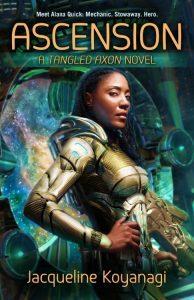
Please be aware that although I've tried to keep it minimal, this review contains spoilers.
Alana Quick is one of the best starship surgeons the non-gentrified City of Heliodor has to offer, or she would be if only someone gave her the chance to prove herself on a real starship. Unhappily trapped in the dusty chop shop she shares with her Aunt Lai on the planet Orpim, and bankrolled by her wealthy spirit guide sister, Alana and Aunt Lai struggle to make ends meet by working on whatever ship rolls their way. The two are desperate to afford the medication that keeps the worst symptoms of their shared condition, Mel's Disorder, at bay, even to the degree that Aunt Lai would take extra hours working a call center job for the shady Transliminal Solutions, an "outsider" business whose mysterious, advanced technology has wiped out the local ship economy. Though she loves her aunt, Alana can't shake her thoughts of escaping into the Big Quiet, and is consumed by her dream of making it off-world.
I can't really get more into it without spoiling some awesome twists and turns, but suffice to say that Alana doesn't stay grounded for long. One thing I can definitively say is that is a standout amongst its peers. Compelling characters meets space opera meets a uniquely metaphysical marriage of technology and astro-spiritualism. Our main protagonist breaks the mold as a queer, disabled woman of color. Breaks the mold in a genre sense, I mean, because Koyanagi gives us a lovable and diverse cast of characters to connect with, and Alana is only one of several significant characters who is affected by a disability, although none of them are defined by it.
This book hits the mark in so many ways, so I'll try to give an overview of those to the searching reader. Non-traditional families abound here, including a rare accurate and healthy look at a functioning polyamorous relationship. Alana's deep and true love for starship engines has spoiled many a human relationship for her. She suffers from the same condition that my favorite Law & Order: SVU detectives do - namely that she is married to her work. She will always, always choose the rush and thrill she gets from starships, for which she has not only a passion but a deep spiritual connection. Alana is burdened with the idea that traditional romance is over for her. Or so she thinks.
Also noteworthy is the exploration and growth of the sibling relationship between Alana and her sister Nova. There are few bonds in media that I feel are as underexplored as the one between siblings. Siblings can be complicated - they can be the greatest of allies or the greatest of enemies, or both at the same time - and the potential for such complexity and nuance is a device that is slowly gaining more traction among writers and media makers. Complex and contradictory is certainly a way to understand the Quick sisters.
A few things I should mention: there are super meta breakdowns of reality and conceptual universe-hopping at some point, so please be aware if that is going to be an existential red flag. There are descriptions of the painful physical symptoms Alana experiences with her Mel's Disorder, dissociative experiences from another character, and descriptions of violence which are not gratuitous but may also be uncomfortable for certain readers.
Overall, I would highly recommend this book for anyone drawn to intergalactic adventures. As a sci-fi lover who is more than aware of how patriarchal and sexist traditional science fiction can be, I am very comfortable describing this book as not like that. If you enjoy this book, I would recommend Becky Chambers' The Long Way to a Small, Angry Planet as a similarly sweeping, queer space opera.

